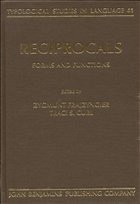Nicht lieferbar

Reciprocals
Forms and functions. Volume 2
Versandkostenfrei!
Nicht lieferbar
Main description:The theoretical issues addressed in the present volume are semantic and cognitive properties of reciprocal events, syntactic properties of reciprocals, and the relationship of reciprocals to other grammatical categories. Several papers discuss the history of reciprocal constructions, offering alternative hypotheses regarding the grammaticalization of reciprocals. The formal, functional, typological and historical approaches in the present volume complement each other, contributing together to the understanding of forms, and syntactic and semantic properties of reciprocal marke...
Main description:
The theoretical issues addressed in the present volume are semantic and cognitive properties of reciprocal events, syntactic properties of reciprocals, and the relationship of reciprocals to other grammatical categories. Several papers discuss the history of reciprocal constructions, offering alternative hypotheses regarding the grammaticalization of reciprocals. The formal, functional, typological and historical approaches in the present volume complement each other, contributing together to the understanding of forms, and syntactic and semantic properties of reciprocal markers. Several papers in the present volume make a double contribution to the problems of reciprocal constructions: they provide new descriptive data and they address theoretical issues at the same time.
The languages discussed include: English, Dutch, German, Greek, Polish, Nyulnyulan (Australia), Amharic
(Ethio-Semitic), Bilin (Cushitic), Chadic languages, Bantu, Halkomelem (Salishan), Mandarin, Yukaghir and a number of Oceanic languages. The volume also includes a study of grammaticalization of reciprocals and
reflexives in African languages.
Table of contents:
- Introduction
- Polysemy involving reflexive and reciprocal markers in African languages
- Reciprocals without reflexives
- Types of anaphoric Expressions
- Reflexive and reciprocal constructions in Nyulnyulan languages
- Reciprocal marking with deictic verbs 'come' and 'go' inMandarin
- Combinatory restrictions on Halkomelem reflexives and reciprocals
- Reciprocals and set construal
- Coding of the reciprocal function
- Subject index
- Author index
- Language index
The theoretical issues addressed in the present volume are semantic and cognitive properties of reciprocal events, syntactic properties of reciprocals, and the relationship of reciprocals to other grammatical categories. Several papers discuss the history of reciprocal constructions, offering alternative hypotheses regarding the grammaticalization of reciprocals. The formal, functional, typological and historical approaches in the present volume complement each other, contributing together to the understanding of forms, and syntactic and semantic properties of reciprocal markers. Several papers in the present volume make a double contribution to the problems of reciprocal constructions: they provide new descriptive data and they address theoretical issues at the same time.
The languages discussed include: English, Dutch, German, Greek, Polish, Nyulnyulan (Australia), Amharic
(Ethio-Semitic), Bilin (Cushitic), Chadic languages, Bantu, Halkomelem (Salishan), Mandarin, Yukaghir and a number of Oceanic languages. The volume also includes a study of grammaticalization of reciprocals and
reflexives in African languages.
Table of contents:
- Introduction
- Polysemy involving reflexive and reciprocal markers in African languages
- Reciprocals without reflexives
- Types of anaphoric Expressions
- Reflexive and reciprocal constructions in Nyulnyulan languages
- Reciprocal marking with deictic verbs 'come' and 'go' inMandarin
- Combinatory restrictions on Halkomelem reflexives and reciprocals
- Reciprocals and set construal
- Coding of the reciprocal function
- Subject index
- Author index
- Language index




